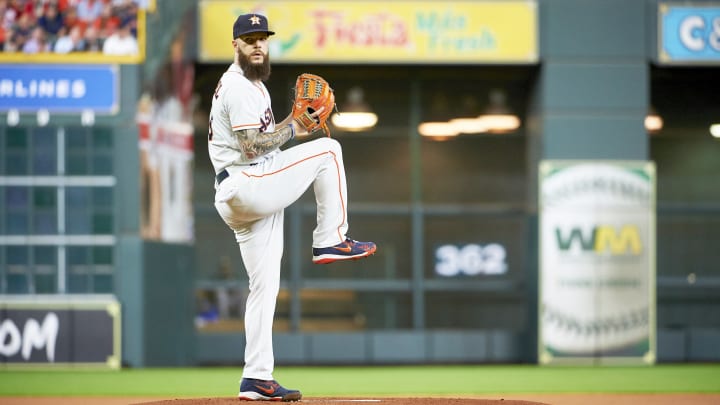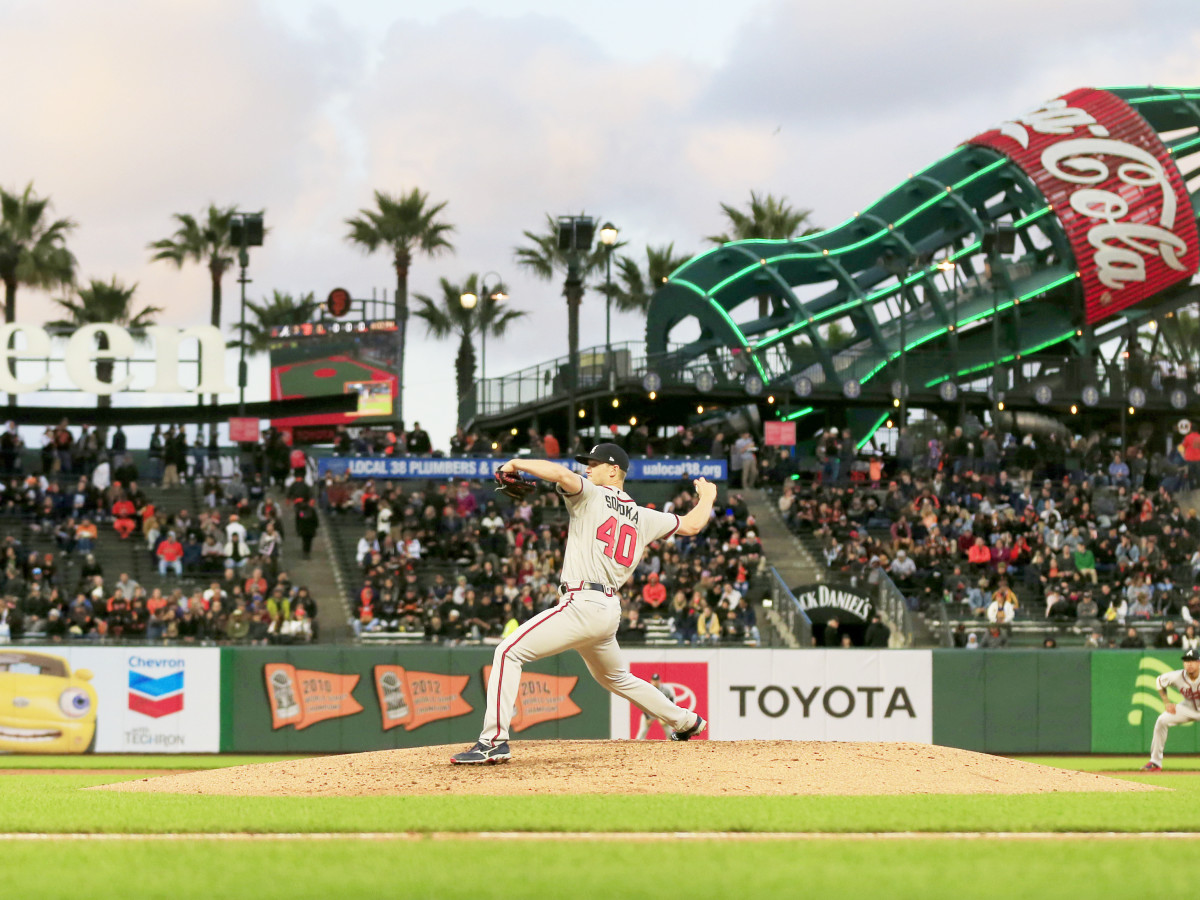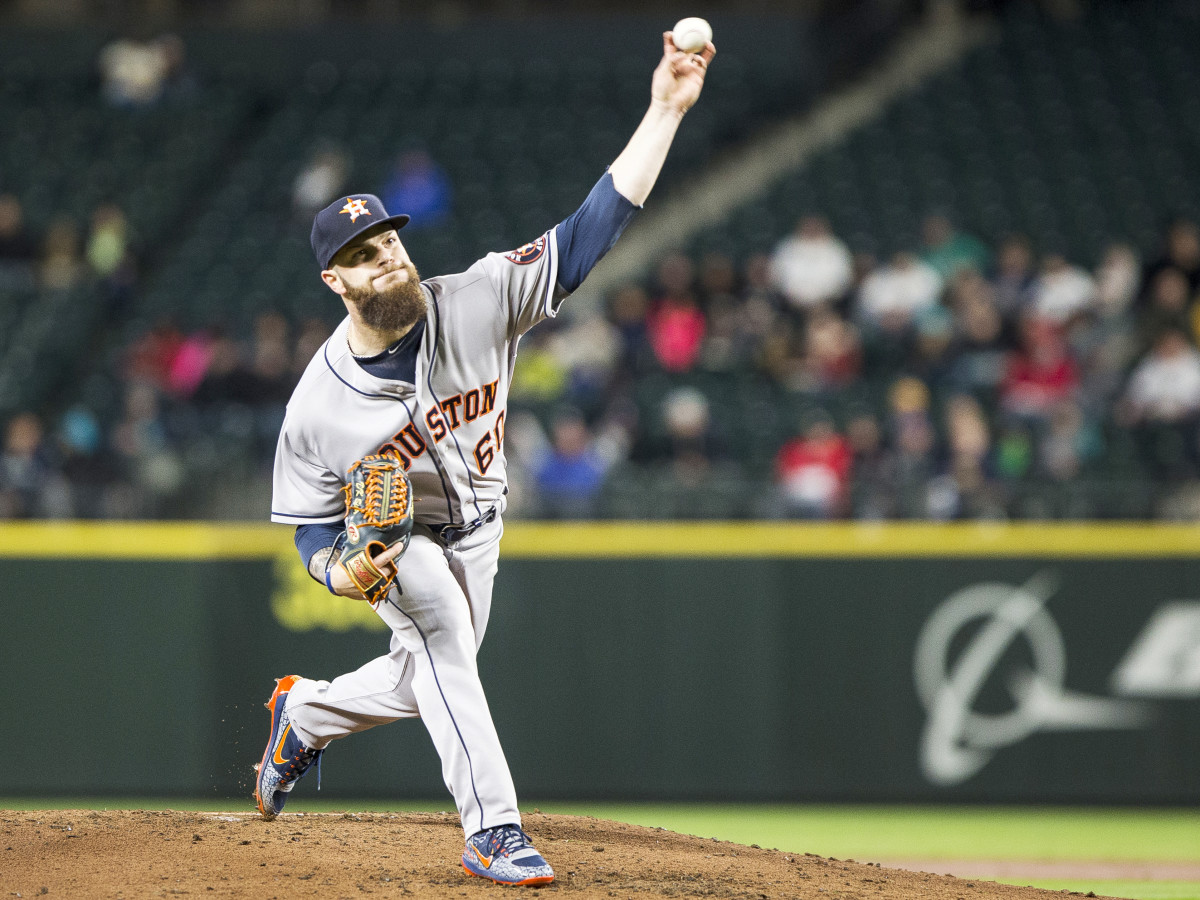Race Against the Clock: Did the Braves Wait Too Long to Sign Dallas Keuchel?

A day after Craig Kimbrel’s long sojourn came to an end, so finally has Dallas Keuchel’s. On Thursday, the ex-Astros lefty reportedly signed a one-year, $13 million deal (or the pro-rated portion of what would have been a $21 million contract), ending a seemingly interminable free-agent stint. That it ends in Atlanta is no real surprise, as the team had a need in the rotation, yet his impact may be muted by the fact that the Braves (and everyone else) took their sweet time in signing him.
Keuchel, 31, has been searching for a new squad since leaving Houston after the end of last season. Reportedly looking for a big long-term deal over the winter, he was met instead with full-blown silence and, like Kimbrel, saw his wait extend well into the season. It came to an end this week only because of the draft, which extinguished the compensation tied to him as a result of the qualifying offer the Astros made back in November. No longer required to give up a pick in exchange for him, several teams quickly moved to strike, with the Braves edging out the Yankees (by a mere $1 million or so), Cardinals and Twins for his services.
In exchange for that $13 million, Atlanta will get a former Cy Young winner and two-time All-Star. Keuchel’s high point was 2015, when he earned that aforementioned Cy Young award by posting a 2.48 ERA and 20 wins in 232 innings. His star has fallen somewhat since then, though: Injuries limited him to 168 and 145 2/3 innings in ’16 and ’17, respectively, and while ’18 was a bounce-back, it was more to the level of a mid-rotation starter (a 3.74 ERA and 110 ERA+) than an ace. Still, Keuchel was healthy enough to make an AL-high 34 starts and toss 204 2/3 innings; only six other starters in the league last year threw more than he did.
That ability to consume innings like a whale swallowing krill is perhaps Keuchel’s greatest and most appealing strength. In an era where pitchers shoulder less and less of the load, the bearded southpaw remains one of the few starters who can both carry a heavy workload and go deep into a game, night in and night out. Last season, he went six or more innings in 23 of those 34 starts and completed seven or more in 11 of them, a figure exceeded by just 11 other starters in 2018.

Atlanta’s rotation has been stronger than most when it comes to getting length out of its starters, with the stellar young duo of Max Fried and Mike Soroka atop it and Julio Teheran, Kevin Gausman and Mike Foltynewicz gamely chugging through their outings. But it’s hard to imagine the Braves, in the thick of the NL East race, being able to rely heavily on either the 22-year-old rookie Soroka, whose career-high in innings pitched in a season is 153 2/3 (with Double-A Mississippi in 2017), or Fried, who has a long history of arm trouble. As for the rest, Gausman and Foltynewicz have both been awful, and Teheran’s peripherals suggest painful regression forthcoming. And while the team has an embarrassment of young pitching riches—such as Touki Toussaint, Bryse Wilson, Sean Newcomb and Kyle Wright—it seems more prudent to have veteran backup in the form of Keuchel than rely on untested youngsters.
The concerns for Atlanta, though, are twofold. First is the fact that Keuchel’s upside is limited. Even while gobbling up outs, he does so in a worrisome way, with zero velocity and relying more on ground balls than strikeouts. Armed with a fastball that struggles to crack 90 mph, his career K rate is a meager 19.1%, and last year’s 17.5 was the fourth lowest among all qualified starters. Conversely, his 53.7% ground-ball rate was the league’s highest, and his 22.4% rate of soft contact was tied for the majors’ fourth-best. It’s a profile that can succeed, but it requires a lot to go right. That and his age are the likeliest reasons why his market was so soft this winter, aided by the collective refusal of teams to pay for talent.
There’s also the question of just how this layoff will affect him. The lefty has been working out and throwing simulated games at the California-based training institute of his agent, Scott Boras, but that doesn’t come close to approximating game conditions or conditioning. So while Keuchel won’t be ramping up from zero, he’ll still need time to get ready. Atlanta will be aggressive with him—he’ll take his physical Friday, then head to Triple-A to make his first start on Saturday—but starters usually require the majority of spring training to get their arms in shape, and even then, the first month of the season can be a sluggish one. Will Keuchel truly be all systems go by July? And after spending all season on the sidelines, how long will it take him to reach peak effectiveness?
The Braves will have to wait and see along with everyone else, and that’s what makes this signing—or at least the timing of it—tough to understand. While Keuchel was looking for a multi-year deal during the offseason, Atlanta easily could have found the financial room for him. The Braves’ payroll is just $116 million—well below both the league average ($135 million) and the luxury tax threshold ($206 million). Nor do they have any onerous deals on the books; if anything, their long-term contracts, like those of Ronald Acuña Jr., Ozzie Albies and Freddie Freeman, are wildly team friendly. Atlanta also knew coming into the season that, while the organization was flush with arms, there wasn’t much in the way of major league-established depth. Keuchel would have been a sensible sign even if it required multiple years and tens of millions of dollars.

Instead, the Braves—and everyone else—dithered, and the result will be an addition that may have no or negative consequence if Keuchel struggles to find his stuff after his lengthy absence. That possibility, coupled with the team’s horrific bullpen, made me think that Atlanta would instead target Kimbrel, as he’ll almost certainly be ready sooner and have a quicker and likely larger impact. But it’s a good bet that Kimbrel’s continued demand for a multi-year contract—he got three years from the Cubs—ruled him out of the Braves’ tight-fisted plans, while Keuchel’s willingness to take just the year-long contract made him a better fit for an ownership group that hates to spend.
The result, then, is Keuchel is perhaps too late to make a difference. If he can rapidly return, he can be a stabilizing force in the middle of the rotation and give Atlanta a playoff-tested arm for the stretch run and into October. But this move would have been better and made more sense had it happened in January (or even March) instead of June. Now, it will be a race against the clock for Keuchel to lend a helping hand before the season runs out.
